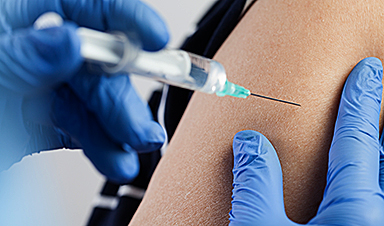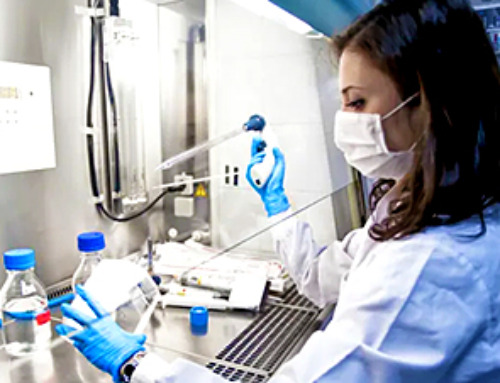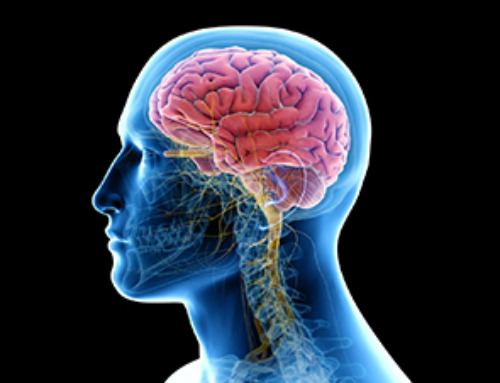According to the Robert Koch Institute (RKI), the norovirus, which is widespread worldwide, is the cause of a large proportion of gastrointestinal infections. Those who catch the virus suffer from nausea, diarrhea and vomiting. It is very contagious and can spread quickly from person to person.
There is not much that can be done preventively beyond general hygiene rules. There is currently no vaccine against the norovirus. However, doctors have now begun to test the world’s first mRNA vaccine against the norovirus.
Norovirus vaccine based on mRNA technology is being tested
The vaccine is to undergo a phase three clinical trial called Nova 301. In two years, 25,000 people, mainly over 60 years old, from countries such as Japan, Canada and Australia are to be involved, reports the Guardian. Mobile teams are also to be used to make it easier for people to participate in the trial.
Half of the participants are to receive the new mRNA vaccine and the other half a saline solution as a placebo. The assignment follows at random.
Various institutions of the British National Health Service (NHS) and the pharmaceutical company Moderna, which manufactures the vaccine, are involved in the study. The norovirus vaccine is based on an mRNA technology with which the company Moderna, but also Pizer/Biontech, have already produced a vaccine against the corona virus.
In an earlier trial with the new norovirus vaccine, strong immune reactions are said to have already been detected in humans. The study is now about investigating whether the vaccine is effective against the virus itself and, if so, how long the protection lasts. “At least 65 percent (efficacy) or more is what we would consider clinically sensible,” the Guardian quotes Dr. Doran Fink of Moderna.
Norovirus is a threat to old and sick people
Norovirus outbreaks are common in hospitals, nursing homes, daycare centers or schools. Especially for very young or old people and for anyone who has a weakened immune system, an infection can have serious consequences. A successful vaccine would help ensure that operations in nursing homes could be maintained normally, says Prof. Saul Faust of the University of Southampton, according to the report.
General practitioner and study leader Dr. Patrick Moore emphasizes how high the burden of norovirus is. Worldwide, there are about 685 million cases and 200,000 deaths every year. In the UK, there are about four million cases a year.
It is hoped that a vaccine could bring health and economic benefits. “In the UK, norovirus costs the NHS an estimated £100 million a year [and] if you take into account the loss of earnings, it’s about £300 million,” says Moore.
If the result of the study is positive, it is expected that it will be possible to submit an application for approval for the vaccine in 2026. However, the review process would take another up to a year. In addition, further studies on teenagers and younger people would be needed.
News
COVID-19 viral fragments shown to target and kill specific immune cells
COVID-19 viral fragments shown to target and kill specific immune cells in UCLA-led study Clues about extreme cases and omicron’s effects come from a cross-disciplinary international research team New research shows that after the [...]
Smaller Than a Grain of Salt: Engineers Create the World’s Tiniest Wireless Brain Implant
A salt-grain-sized neural implant can record and transmit brain activity wirelessly for extended periods. Researchers at Cornell University, working with collaborators, have created an extremely small neural implant that can sit on a grain of [...]
Scientists Develop a New Way To See Inside the Human Body Using 3D Color Imaging
A newly developed imaging method blends ultrasound and photoacoustics to capture both tissue structure and blood-vessel function in 3D. By blending two powerful imaging methods, researchers from Caltech and USC have developed a new way to [...]
Brain waves could help paralyzed patients move again
People with spinal cord injuries often lose the ability to move their arms or legs. In many cases, the nerves in the limbs remain healthy, and the brain continues to function normally. The loss of [...]
Scientists Discover a New “Cleanup Hub” Inside the Human Brain
A newly identified lymphatic drainage pathway along the middle meningeal artery reveals how the human brain clears waste. How does the brain clear away waste? This task is handled by the brain’s lymphatic drainage [...]
New Drug Slashes Dangerous Blood Fats by Nearly 40% in First Human Trial
Scientists have found a way to fine-tune a central fat-control pathway in the liver, reducing harmful blood triglycerides while preserving beneficial cholesterol functions. When we eat, the body turns surplus calories into molecules called [...]
A Simple Brain Scan May Help Restore Movement After Paralysis
A brain cap and smart algorithms may one day help paralyzed patients turn thought into movement—no surgery required. People with spinal cord injuries often experience partial or complete loss of movement in their arms [...]
Plant Discovery Could Transform How Medicines Are Made
Scientists have uncovered an unexpected way plants make powerful chemicals, revealing hidden biological connections that could transform how medicines are discovered and produced. Plants produce protective chemicals called alkaloids as part of their natural [...]
Scientists Develop IV Therapy That Repairs the Brain After Stroke
New nanomaterial passes the blood-brain barrier to reduce damaging inflammation after the most common form of stroke. When someone experiences a stroke, doctors must quickly restore blood flow to the brain to prevent death. [...]
Analyzing Darwin’s specimens without opening 200-year-old jars
Scientists have successfully analyzed Charles Darwin's original specimens from his HMS Beagle voyage (1831 to 1836) to the Galapagos Islands. Remarkably, the specimens have been analyzed without opening their 200-year-old preservation jars. Examining 46 [...]
Scientists discover natural ‘brake’ that could stop harmful inflammation
Researchers at University College London (UCL) have uncovered a key mechanism that helps the body switch off inflammation—a breakthrough that could lead to new treatments for chronic diseases affecting millions worldwide. Inflammation is the [...]
A Forgotten Molecule Could Revive Failing Antifungal Drugs and Save Millions of Lives
Scientists have uncovered a way to make existing antifungal drugs work again against deadly, drug-resistant fungi. Fungal infections claim millions of lives worldwide each year, and current medical treatments are failing to keep pace. [...]
Scientists Trap Thyme’s Healing Power in Tiny Capsules
A new micro-encapsulation breakthrough could turn thyme’s powerful health benefits into safer, smarter nanodoses. Thyme extract is often praised for its wide range of health benefits, giving it a reputation as a natural medicinal [...]
Scientists Develop Spray-On Powder That Instantly Seals Life-Threatening Wounds
KAIST scientists have created a fast-acting, stable powder hemostat that stops bleeding in one second and could significantly improve survival in combat and emergency medicine. Severe blood loss remains the primary cause of death from [...]
Oceans Are Struggling To Absorb Carbon As Microplastics Flood Their Waters
New research points to an unexpected way plastic pollution may be influencing Earth’s climate system. A recent study suggests that microscopic plastic pollution is reducing the ocean’s capacity to take in carbon dioxide, a [...]
Molecular Manufacturing: The Future of Nanomedicine – New book from Frank Boehm
This book explores the revolutionary potential of atomically precise manufacturing technologies to transform global healthcare, as well as practically every other sector across society. This forward-thinking volume examines how envisaged Factory@Home systems might enable the cost-effective [...]





















